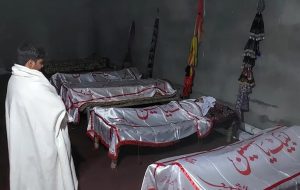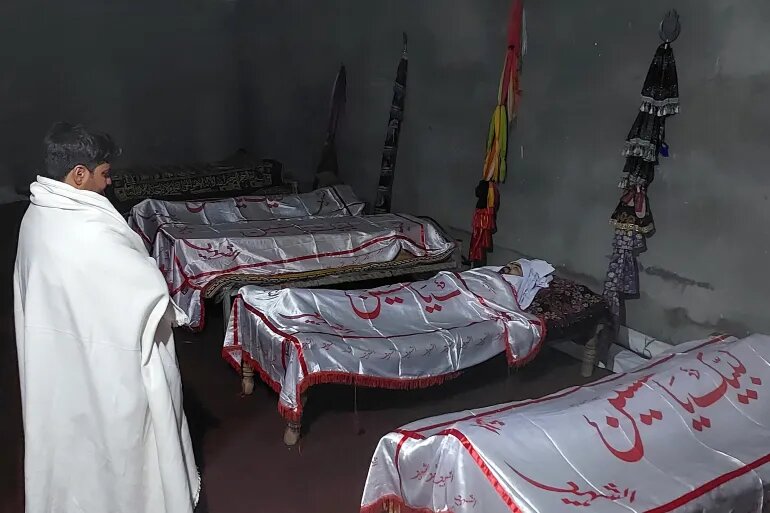Parachinar faces “genocide and terrorism”
TEHRAN – The plight and sufferings of Shia Muslims in Pakistan’s restive northwest have come to the fore in the wake of the recent deadly attacks in the region. Shia Muslims in Kurram district in Pakistan’s northwestern province of Khyber Pakhtunkhwa have regularly been targeted. Dozens of people were killed and scores of others injured in


TEHRAN – The plight and sufferings of Shia Muslims in Pakistan’s restive northwest have come to the fore in the wake of the recent deadly attacks in the region.
Shia Muslims in Kurram district in Pakistan’s northwestern province of Khyber Pakhtunkhwa have regularly been targeted.
Dozens of people were killed and scores of others injured in renewed violence in Kurram last week.
On Thursday, gunmen ambushed and killed 42 Shia Muslims, including women and children in the area.
The victims were traveling in a convoy of multiple vehicles from Parachinar, the Shia-majority and the main town in Kurram, to Peshawar, the capital of Khyber Pakhtunkhwa province.
Survivors said the attackers exited a vehicle and opened fire on the buses and cars.
The New York Times: Allama Ahmed Iqbal Rizvi, a Shia leader, said Tehreek-e-Taliban Pakistan and the local branch of ISIS have been targeting the Shia population in Kurram for a long time. Prime Minister Shehbaz Sharif and President Asif Ali Zardari denounced the attack. The Pakistani premier said those behind the killing of innocent civilians will not go unpunished. Interior Minister Mohsin Naqvi labeled the shootings a “terrorist attack.”
Funerals were held for the victims on Friday. Markets, shops, and schools were closed in Parachinar, which is located near the Afghanistan border. Locals and families of the victims staged a sit-in, demanding action against the perpetrators.
But violence against Shia Muslims showed no sign of abating as nearly 20 others were killed overnight on Saturday during fresh attacks.
Videos and images on social media showed a market consumed by fire and orange flames in the night sky. Gunfire could also be heard.
People have protested in Kurram and blamed the government and the authorities for failing to provide security to the citizens in the area.
Shia groups in Pakistan announced a three-day mourning period following Thursday’s killings. They also organized protests in all of Pakistan’s major cities, including Lahore and Karachi.
Affiliates of terror groups such as ISIS, also known as ISIL and Daesh, stand accused of carrying out attacks against Shia Muslims in Kurram in an attempt to establish their presence in the district.
Allama Ahmed Iqbal Rizvi, a Shia leader, said various militant groups, such as Tehreek-e-Taliban Pakistan and the local branch of ISIS; the so-called Islamic State Khorasan Province, or ISIS-K — have been targeting the Shia population in Kurram for a long time, according to the New York Times.
Armed extremists laid siege to Parachinar between 2007 and 2012, hindering the supply of essentials which led to the tragic loss of hundreds of lives.
“It is the incompetence of the government and state institutions,” Rizvi added, based on a report published by the Times.
Relatives of the victims and local leaders have demanded immediate action against the perpetrators of such crimes against Shia Muslims. Human rights organizations have also condemned such attacks as a form of genocide.
Armed extremists besieged Parachinar from 2007 to 2012 and obstructed the delivery of essentials such as food and medicine for the Shia community. The siege resulted in the loss of hundreds of lives. Thousands of others were also displaced.
The recent developments underscore the urgent necessity for the Pakistani government with the help of peace activists, civil society organizations, and high-profile figures to draw up effective strategies to address these heinous attacks against Shia Muslims, ensuring that the residents of Parachinar can enjoy a secure and tranquil life.
The Pakistani government should also ensure that perpetrators are held accountable and brought to justice.
